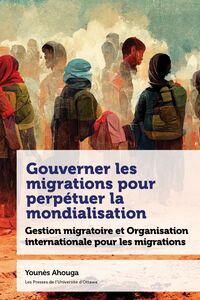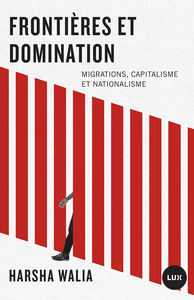
Gouverner les migrations pour perpétuer la mondialisation
Gestion migratoire et Organisation internationale pour les migrations
Younès Ahouga
Migration management is a concept that proposes regulatory transparency in dealing with the realities of international migration. Migration management reduces the complexity of related regulation to make it more intelligible, to govern in a depoliticized, technocratic way, and to ensure the movement of globalization. In the absence of an international migration framework, however, migration management faces competition from the securitization and liberalization of migration. For migration management to endure, it must rely on the material application of its interpretations enabled by institutions. To understand the evolution of migration management from interpretation to application within the International Organization for Migration (IOM), this book notes three moments, its emergence, its organisation and its engagement From the early 2000s to 2018, this key institution in migration governance notably expanded its role and activities to include migration management.
This book’s approach blends cultural political economy and critical discourse analysis to examine the evolution of a concept allowing for the interaction of the production of meaning, social actors' capacity for action, structuring of the institutional context, and government technologies. Based on an analysis of IOM meetings and documents, the author reveals how various international civil servants, diplomats and experts have formulated, disseminated, applied, or contested migration management.
The study of this concept helps to understand IOM's transformation and its role in the constitution of a new migration governance, following the adoption of the Global Compact for Migration in 2018.
La gestion migratoire est un imaginaire qui préconise l’ouverture régulée face aux migrations internationales. Il réduit leur complexité pour les rendre intelligibles, les gouverner d’une manière dépolitisée et technocratique, et pour perpétuer les flux de la mondialisation. Mais en l’absence d’un régime international de la migration, la gestion migratoire est concurrencée par les imaginaires de la sécurisation et de la libéralisation des migrations. Sa sédimentation durable dépend alors de la construction matérielle de ses interprétations à travers des institutions. Pour comprendre cette évolution de la gestion migratoire de l’interprétation à la construction, cet ouvrage retrace les trois moments de son émergence, de sa sélection et de son maintien au sein de l’Organisation internationale pour la migration (OIM). Cette institution clé de la gouvernance migratoire a été marquée du début des années 2000 à 2018 par l’extension de son rôle et de ses activités à l’aune de la gestion migratoire.
Cet ouvrage mobilise une approche qui mêle économie politique culturelle et analyse critique du discours pour examiner l’évolution d’un imaginaire à partir de l’interaction entre production de sens, capacité d’action des acteurs sociaux, structuration du contexte institutionnel, et technologies gouvernementales. Fort de l’analyse de réunions et documents de l’OIM, l’ouvrage révèle comment divers fonctionnaires internationaux, diplomates et experts ont formulé, diffusé, matérialisé ou encore contesté la gestion migratoire.
L’étude de cet imaginaire permet de comprendre la transformation de l’OIM et son rôle dans la constitution d’une nouvelle gouvernance migratoire suite à l’adoption en 2018 du Pacte mondial pour les migrations.
Book details
-
Publisher
-
Language
French -
Publication date
-
Page count
248 -
Series edited by
-
Theme






